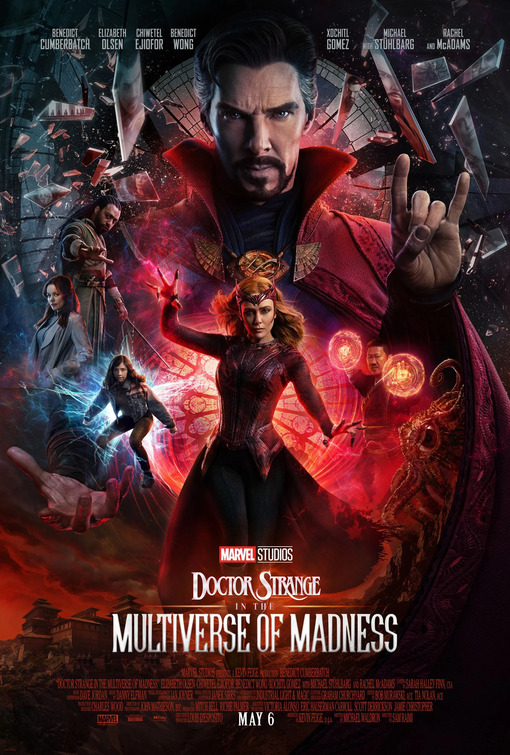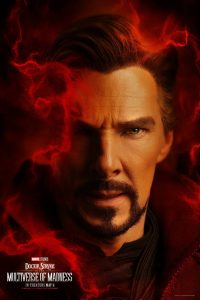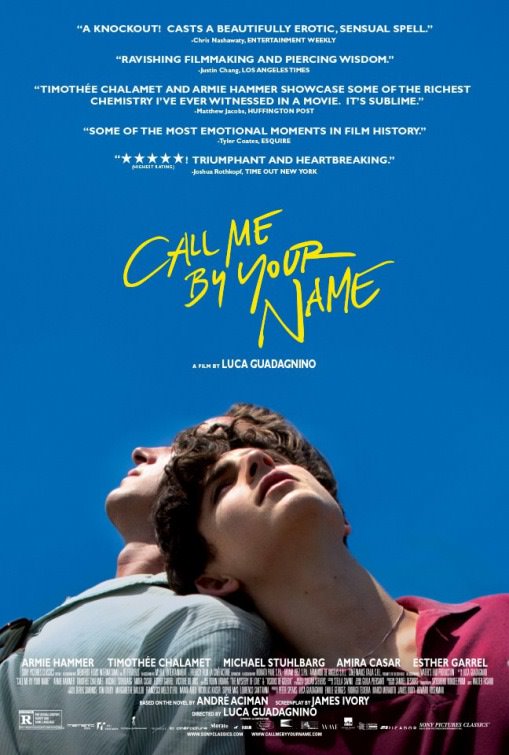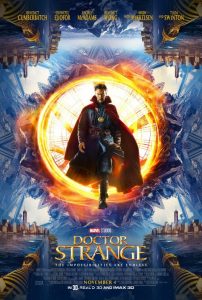Posts Tagged ‘Michael Stuhlbarg’
Dream Walking and Witchcraft
Doctor Strange in the Multiverse of Madness

Director: Sam Raimi
Cast: Benedict Cumberbatch, Elizabeth Olsen, Rachel McAdams, Chiwetel Ejifor, Benedict Wong, Xochitel Gomez, Michael Stuhlbarg, John Krasinki, Patrick Stewart, Hayley Atwell, Lashana Lynch, Anson Mount
Running Time: 2 hours and 6 minutes
Film Rating: 6 out of 10
Six years after the first Doctor Strange film was made in 2016, Oscar nominee Benedict Cumberbatch (The Imitation Game, The Power of the Dog) reprises his role as the neurosurgeon turned warlock Doctor Steven Strange in director Sam Raimi’s utterly bizarre sequel Doctor Strange in the Multiverse of Madness starring a new batch of stars while only Rachel McAdams, Benedict Wong and Chiwetel Ejifor reprise their roles from the first film.

Director Sam Raimi best known for doing the original Spiderman trilogy with Tobey Maguire and Kirsten Dunst but the director is far better known for helming some classic horror flicks including Drag Me to Hell in 2009 and The Evil Dead in 1981, takes this Doctor Strange sequel and turns the superhero genre on its head and transforms it into a ghoulish mixture of the bizarre with an extremely heavy dash of CGI thrown in. The storyline is incoherent and utterly weird.

This time Doctor Strange has to save a multiverse superhero called America Chavez played by Xochitel Gomez from the clutches of the Scarlett Witch also known as Wanda Maximoff wonderfully played with a demonic edge by Elizabeth Olsen (Avengers: Infinity War, Wind River) as she seeks to use America’s superpowers to open the elusive book of Ashanti. Elizabeth Olsen is by far the best actress in this film as she gives the Scarlett Witch a degree of emotional depth and conflicting maternal instinct, making her character a far more unlikely villain.

Plenty of witchcraft and dream walking abound through a multitude of crazy universes including a particularly bizarre scene whereby Doctor Strange faces the Illuminati made up of Baron Mondo played by Chiwetel Ejifor (12 Years a Slave, Dirty Pretty Things, Kinky Boots), Captain Carter played by Hayley Atwell and wait for it…. an X-Men Professor and one of the characters of The Fantastic Four. Clearly this is not the multiverse of reality one expects.

Here the film completely loses the plot and director Sam Raimi goes for an utter freak show of scary scenes involving ghosts and demons instead of rounding off the narrative in a tightly controlled script.
After watching Benedict Cumberbatch deliver such a brilliant performance in The Power of the Dog, he looked continually anguished throughout this film at having to do a Doctor Strange sequel and not even a good one at that.
Essentially, my question is that if Marvel is so desperate to control the cinematic universe why did they get a horror director to take charge of what is meant to be a superhero film?
After watching the success of Spiderman: No Way Home and the excellent origin film The Batman, I was quite disappointed with the visual mess that is Doctor Strange in the Multiverse of Madness even despite some lavish special effects.
Doctor Strange in the Multiverse of Madness gets a film rating of 6 out of 10 and audiences should expect a superhero film which is way more scary than expected.
The Nonchalance of Youth
Call Me by Your Name
Director: Luca Guadagnino
Cast: Timothee Chalamet, Armie Hammer, Michael Stuhlbarg, Amira Casar, Esther Garrel, Victorie du Bois
Andre Aciman’s sensuous 1988 debut novel Call Me by Your Name is skilfully adapted into a superb screenplay by James Ivory of Merchant Ivory fame and beautifully brought to the big screen by Italian director Luca Guadagnino.
Call Me by Your Name centres on the erotic summer romance of Elio, a young Jewish Italian boy discovering the essence of his sexuality and his parents American house guest, a 24 year old American classics student Oliver wonderfully played by Armie Hammer (The Man from Uncle) in possibly his best on screen role yet, who is staying with the family in the summer of 1983 as a cultural exchange.
It is the break out performance of star Timothee Chalamet as the restless Elio which is the cinematic revelation and as he deftly centres the film in all its beauty skillfully conveying the nonchalance of youth and his perpetual desire for self-discovery.
Elio’s parents Mr Perlman played by Michael Stuhlbarg (The Shape of Water) and Annella played by Amira Casar who are a liberal and fairly affluent Italian couple who allow their only son, young Elio all the indulgences of youth.
Director Luca Guadagnino sumptuously captures the Italian country summer creating a gorgeous landscape for Elio and Oliver to indulge in an intimate and erotic affair which is tenderly portrayed without moral judgement or vulgarity, a beautiful depiction of sexual discovery and emotional resonance made poignant by the brevity of their idyllic romance.
In a particularly insightful scene between Elio and his compassionate father, Mr Perlman utters the significant line: “Nature has a cunning way of finding our weakest spot.”
Timothee Chalamet captures all the confusion and emotional insecurity of his various sexual encounters with a luminosity seldom seen in cinema today. Chalamet is indeed a star to watch out for. The luxuriant and lingering tone of the film transports audiences into a languid Italian summer, a beautiful sensuous stupor which they will find difficult to relinquish even as the closing credits appear on the screen.
Call Me by Your Name is beautifully acted particularly by its two male leads and superbly shot, making the film a mesmerizing cinematic experience. There are very few films being produced like this today and Luca Guadagnino captures that visual rarity of a first love on screen with a tenderness and beauty which is reminiscent of the Roman statue from antiquity emerging from Lake Garda.
Audiences that enjoyed the early Merchant Ivory films like Maurice and A Room with a View will love Call Me by Your Name.
This evocative film gets a rating of 9.5 out of 10 and is one of the most exquisite films I have seen aided by an equally brilliant soundtrack.
History’s First Draft
The Post
Director: Steven Spielberg
Cast: Meryl Streep, Tom Hanks, Sarah Paulson, Jesse Plemons, Carrie Coon, Bob Odenkirk, Bruce Greenwood, Tracy Letts, Michael Stulbarg, Matthew Rhys, Bradley Whitford, Alison Brie
Before Julian Assange, before Edward Snowden, there was the Pentagon Papers.
A top level government study on how the Americans had been involved in Vietnam way before the infamous Vietnam War and how during that bloodletting fiasco, the Americans realized that they were losing the war in South East Asia, yet still continued to send troops in to fight the Viet Cong.
The leaking of the Pentagon Papers, firstly by the New York Times and then more pertinently by The Washington Post during the Nixon administration is the source of Oscar winning director Steven Spielberg’s fascinating film The Post starring two Oscar winners, Meryl Streep (The Iron Lady) as owner of the Post, Katherine Graham and Tom Hanks (Philadelphia) as Ben Bradlee, the executive editor of The Washington Post https://www.washingtonpost.com/ who seizes on the story of a decade and pushes for his newspaper to release the classified documents despite the possible legal or financial consequences.
Streep as usual, is superb as the doubtful and affluent socialite Katherine Graham who inherits her father’s newspaper The Washington Post upon her husband’s death and then is forced into an invidious position when she is called upon to make the critical decision on whether to let the newspaper publish the Pentagon Papers at a time when New York investors are eagerly awaiting The Washington Post Company’s IPO (Initial Public Offering) on the American Stock Exchange, which could hugely benefit the fortunes of the struggling newspaper.
Spielberg packs a lot into The Post, and it would be advisable for viewers to read up thoroughly about that crucial historical period in 1971 which was so decisive and widely regarded as the turning point of American press freedom. All these events occurred prior to the Watergate scandal.
The publication of the Pentagon Papers ultimately changed the American public’s sentiment on the viability of troops in Vietnam and the legal outcome after the Supreme Court ruling elevated Katherine Graham to a media doyenne, a feminist and a massively influential woman who changed the business world’s view on how a single woman can influence and transform a media empire.
There is a solid supporting cast of actors in The Post to add gravitas to a riveting tale of journalistic bravery, including Sarah Poulson as Bradlee’s wife Toni who gives her own feminine perspective on why what Katherine Graham was doing was vitally important and brave. Other supporting actors include Bob Odenkirk, Matthew Phys, Carrie Coon, Jesse Plemons and Tracy Letts.
In the age of the Internet, Fake News and a 24 Hour news cycle, The Post is a critical film to watch and be discussed and is especially relevant in 2018 as back then in 1971, which basically implies that at every historical junction, the media must always hold the country’s government accountable. After all, the news is History’s First Draft.
My only criticism is that screenwriters Liz Hannah and Josh Singer should have contextualized the dramatic events more efficiently so that a 21st century audience could appreciate the bravery of publishing critical information without fear or favour.
The Post is brilliant viewing and a highly recommended film about press freedom under a sinister government which makes the film’s ending all the more relevant. The Post receives a film rating of 8.5 out of 10.
Read more on Katherine Graham – https://en.wikipedia.org/wiki/Katharine_Graham
Read more on Ben Bradlee – https://en.wikipedia.org/wiki/Ben_Bradlee
Seducing an Amphibian
The Shape of Water
Director: Guillermo del Toro
Cast: Sally Hawkins, Doug Jones, Michael Shannon, Octavia Spencer, Richard Jenkins, Michael Stulbarg, David Hewlett, Martin Roach
Mexican director Guillermo del Toro reinvents cinematic magic realism in this darkly sublime fantasy adventure The Shape of Water featuring a stand out performance by British actress Sally Hawkins and character actor Michael Shannon.
Set in a covert government laboratory in Baltimore in the early 1960’s at the height of the cold war, The Shape of Water deftly weaves an extraordinary and compelling story of a young mute woman Elisa Esposito played by Hawkins (Happy Go Lucky, Blue Jasmine) who along with her co-worker Zelda Fuller played by Oscar winner Octavia Spencer (The Help) play observant cleaners in this secret facility ruled by the vain and cruel manager, Richard Strickland, wonderfully played with an ambivalent menace by Oscar nominee Michael Shannon (Nocturnal Animals, Revolutionary Road).
Elisa lives with a repressed homosexual Giles who is struggling to reignite his graphic design business. Giles is played with an exuberant flair by Oscar nominee Richard Jenkins (The Visitor).
What is so magnificent about The Shape of Water is the brilliant script co-written by del Toro and Vanessa Taylor and the intriguing plot is underscored by a tantalizing musical score by Oscar winner Alexandre Desplat who also provided the fantastic original score for director Wes Anderson’s The Grand Budapest Hotel.
Highlighting the duplicitous Cold War, is the fastidious scientist Dr Robert Hoffstetler beautifully played by character actor Michael Stuhlbarg (A Serious Man, Trumbo, Miles Ahead).
Eliza, the sexually charged mute cleaning lady develops a sensual bond of the most unusual nature with the Amphibian man played by Doug Jones, who is both exotic, dangerous and restorative. This Amphibian was discovered in the South American jungle and worshipped as a God by the indigenous tribes only to be snatched by sinister American agents to be used as a guinea pig in a space race against the murky and nefarious Soviets.
The Shape of Water is an intelligently woven allegorical tale about the exotic entering a decade of American consumerism which was as paranoid as it was dictatorial: the 1960’s. Set against the Cold War, this augmented paranoia is heightened through various well placed TV images of the rising tensions of the civil rights movements permeating in the background, along with many other counter-cultural movement which eventually undid the 1960’s completely and changed America forever.
Visually, The Shape of Water is rich with symbolic imagery and director Guillermo del Toro relishes in mixing the brutal with the gorgeous.
The love of cinema shines through in The Shape of Water, which I consider to be del Toro’s best work with the exception of his Oscar winning foreign language film, Pan’s Labyrinth.
The performances by a mostly ensemble cast are exemplary in a film that will dazzle the senses aided by exceptionally high production values and a quirky story which is both lyrical and tragic.
Highly recommended viewing, The Shape of Water gets a film rating of 9 out of 10.
The Universal Language
Arrival
Director: Denis Villeneuve
Cast: Amy Adams, Jeremy Renner, Forest Whitaker, Michael Stulbarg, Mark O’Brien, Tzi Ma
With a screenplay by Eric Heisserer based on the story “Story of Your Life” written by Ted Chiang, French Canadian director Denis Villeneuve’s latest film Arrival gives Oscar nominee Amy Adams (American Hustle, The Master, Doubt) full scope to flex her truly extraordinary acting abilities.
Adams plays a Linguistics expert Dr. Louise Banks who is enlisted by the US army, when an alien space craft lands in Montana. However as Arrival gains momentum, it appears that there are 11 other similar alien space crafts that have landed unexpectedly in places throughout the world from The Sudan to Venezuela.
Banks is joined by Ian Donnelly played by Oscar nominee Jeremy Renner (The Hurt Locker, The Town) as they become the proverbial couple who must make first contact with the aliens and decipher their complicated circular means of communication and ultimately discover what their true purpose is on earth? Are they friendly aliens or have they come to annihilate earth?
As other nations around the world become increasingly hostile to the foreign ships in their territories, mainly China and the American military is becoming more trigger happy that the aliens which take the form of giant squid have malignant intentions, Banks and Donnelly must race against time to establish a pattern of communication to discover their real intention.
Skilfully shot and mostly done in a murky light, cinematographer Bradford Young photographs Arrival very dimly at first but soon as the narrative progresses, the film becomes brighter and more explanatory.
What really makes Arrival so distinctive a film, especially about the possibility of contact with alien life forms is the skillful direction of Villeneuve who portrays the contacts between Banks and the aliens in a non-linear form.
Secondly, it is Amy Adams superb performance as Dr Louise Banks who is desperate to not only save humanity but forge a future for herself beyond this supernatural event. Adams is brilliant in this role and most of the screen time is taken up with her contradicted thoughts and emotional turmoil as the mental toll of what she is trying to achieve is distinguishable in every frame.
Whilst the rest of the cast including Renner and Oscar winner Forest Whitaker (The Last King of Scotland) playing Colonel Weber along with character actor Michael Stulbarg as Agent Halpern all inhabit peripheral roles, it is Amy Adams’s performance which makes Arrival so absorbing to watch.
Visually the film is dark and almost perplexing but director Villeneuve handles the subject matter of first contact so elegantly that for moments, audiences will forget they are watching a sci-fi film.
Arrival is an extraordinary film with many intuitive moments much like the Universal Language that Dr Louise Banks discovers and ultimately ends on a poignant note, without resorting to corny or special effects laden farce. Arrival is a cinematic treat exploring how we as human beings assimilate language, despite there being so many different variations. Highly recommend viewing.
Mastering your Demons
Doctor Strange
Director: Scott Derrickson
Cast: Benedict Cumberbatch, Rachel McAdams, Chiwetel Ejiofor, Tilda Swinton, Benedict Wong, Mads Mikkelsen, Michael Stulbarg, Benjamin Bratt, Scott Adkins, Chris Hemsworth
Marvel is certainly expanding their cinematic universe at a rapid rate. First it was The Avengers and then The Guardians of the Galaxy and now they have turned their attention to the mystical antihero Doctor Strange, transforming the comic book character into a visually dazzling film version by director Scott Derrickson.
Heavily influenced by Christopher Nolan’s surreal city scape bending visuals in his 2010 blockbuster Inception, Doctor Strange is a spectacular anti-hero film centred on an arrogant neurosurgeon wonderfully played by Oscar nominee Benedict Cumberbatch (The Imitation Game).
As the film begins, audiences catch a glimpse of Doctor Strange medical expertise as well as his supreme arrogance and wealth. However all that suave egotistical bravado comes crashing down when he plunges his sports car off a cliff outside New York City and soon loses all nerve sensations in his hand.
At first he is naturally devastated and despite being comforted by sometime lover and co-worker Dr Christine Palmer, played by Oscar nominee Rachel McAdams (Spotlight), Doctor Strange sets off for an alternative cure prompted by a meeting with a miracle paraplegic Jonathan Pangborn played by Benjamin Bratt (Love in the Time of Cholera, Traffic).
Naturally the action shifts to Kathmandu, Nepal, where Doctor Strange is introduced to the mystical arts by the shaven head guru The Ancient One, superbly played by Oscar winner Tilda Swinton (Michael Clayton). The best dialogue in the film are reserved for Cumberbatch and Swinton as The Ancient One strips Doctor Strange of his arrogance and he discovers a mystical world of parallel universes and scriptures written in ancient languages.
Soon Doctor Strange takes a liking to a flying crimson cape and has sideburns to match Frankenstein. With a new mystical persona, Doctor Strange delves into pure fantasy with brilliant mind bending visual effects to match.
The Visual Effects are so inspiring that they should get an Oscar on their own. In this case Doctor Strange has come up trumps with a perfect cast, most of them Oscar nominees and winners and a strong narrative which establishes more films in the Defenders Universe.
As the action shifts to Hong Kong, Doctor Strange with the help of Mordo played by Oscar Nominee Chiwetel Ejiofor (12 Years a Slave) and Wong played by Benedict Wong, this diverse mystical trio must battle the evil and embittered Kaecilius played by Danish actor Mads Mikkelsen (Casino Royale) who is intent on unleashing dark forces on planet earth in a bid to achieve immortality.
Doctor Strange is visually brilliant and superbly acted by the cast, due to some clever casting choices by Marvel Studios. The fact that Tilda Swinton, initially known for her art house films like Sally Potter’s Orlando and Benedict Cumberbatch seen in British period films like Atonement and Creation are both in a Marvel’s Anti-Hero movie is testament to how seriously the film studio takes their brand as they continuously expand all the various superhero franchises and even delve into quirky Sci-Fi.
Audiences must stay seated after the credits as Doctor Strange has an unexpected meeting with Asgard’s protector…
Highly recommended viewing for those that enjoy all of Marvel’s films or would love to visit Comicon.
A Jazzy Jive
Miles Ahead
Director: Don Cheadle
Cast: Don Cheadle, Ewan McGregor, Michael Stulbarg, Emayatzy Corinealdi, Austin Lyon, Keith Stanfield
Don Cheadle (Hotel Rwanda) makes his directorial debut in the superb, frenetic portrait of legendary jazz musician Miles Davis and starring in the main role in the brilliant film Miles Ahead which premiered at the 37th Durban International Film Festival http://www.durbanfilmfest.co.za/ . If the 2017 Oscars are looking for more diversity they should look no further than Don Cheadle’s wonderful performance, so captivating, energetic and entrancing. Cheadle should definitely earn an Oscar nomination for this studied and embracing performance of a jazz icon, that he holds in high esteem.
Set in New York at the end of the 1970’s Cheadle plays a reclusive Miles Davis who along with struggling a multitude of additions has not release a new album in years. In steps Ewan McGregor as the brash Rolling Stones journalist Dave Brill who coaxes Davis out of his liar to confront his own demons and a music business which is cut throat dangerous and down right greedy.
Through a series of perfectly placed flashbacks audiences get a glimpse of an earlier version of Miles Davis as he begins courting the gorgeous dancer Frances Taylor wonderfully played by the beautiful Emayatzy Corinealdi who was last seen in the stunningly brutal mini-series Roots.
As Miles and Dave embark on a frantic search for a recording of some his new music which was unfortunately stolen at a wild party at Davis’s New York apartment, they come across the shady and almost unrecognizable Michael Stulbarg last seen in Trumbo as gangster Harper Hamilton who has vested interests in the music business. Watch the brilliant 1970’s series Vinyl for more substance on this topic.
At the heart of Miles Ahead, is Miles Davis’s passion for brilliant music and his understanding of how classical music informed the evolution of the jazz movement which many in the establishment regarded as risque.
Interestingly, Miles Ahead, also makes a strong point about racial integration as Davis was definitely a man who had been prejudiced against and he desperately wanted to smash any racial stereotypes. In one scene in the film, Miles Davis is even arrested by a bigoted cop outside the venue where he is performing for loitering.
The dynamic scenes between Cheadle and McGregor make Miles Ahead so fascinating as they race around New York fuelled by drugs and alcohol to find the missing jazz score. More importantly, fans of Miles Davis will love the soundtrack as a jazzy jive which keeps the film fresh, funky and absolutely engaging.
Miles Ahead is highly recommended viewing, an entertaining portrait of the legendary Miles Davis who by his attitude and music was definitely way ahead of his time.
Demonizing Dalton
Trumbo
Director: Jay Roach
Cast: Bryan Cranston, Diane Lane, Elle Fanning, Louis C. K. Michael Stuhlbarg, Helen Mirren, John Goodman, Stephen Root, Roger Bart, Dean O’ Gorman, Alan Tudyk, Adewale Akinnuoye-Agbaje
Director Jay Roach really gives audiences an opportunity to witness Bryan Cranston’s acting talents first hand as Cranston plays the Oscar nominated role of blacklisted Hollywood screenwriter Dalton Trumbo in California in the late 1940s and throughout the 1950’s.
With the rise of McCarthyism in the early 1950’s and the vindictive Committee on Un-American Activities whose sole aim was to root out the perceived communist threat within Hollywood and many other facets of American society, the anti-communist witch hunt become notorious for ruining reputations and lives of artists, actors, directors and screenwriters. Even the famous playwright Arthur Miller was perceived as a threat and his persecution was illustrated in his classic play The Crucible.
Dalton Trumbo, wonderfully played by Cranston, is an unconventional yet brilliant screenwriter who becomes one of the Hollywood Ten perceived by the Committee as harbouring Communist sympathies. Trumbo was, as his friend Arlen Hird played by Louis C. K. said, a Socialist with Champagne tastes. His flamboyant cigarette smoking, his unusual method of writing screenplays in the bath, his reliance on Benzedrine were all traits of a fierce creative genius who was ripe for prosecution.
Michael Stuhlbarg also gives an impressive performance as Edward G. Robinson who will do anything to maintain his lavish lifestyle.
In one of the great artistic injustices, Trumbo is found in contempt of the Supreme Court and sentenced to a Kentucky penitentiary for close to 18 months. Upon Trumbo’s release he is faced with the prospect of supporting his wife Cleo played by Diane Lane (Unfaithful) and three growing children, one of which is his feisty daughter Nicola superbly played by Elle Fanning (Maleficent).
Trumbo approaches a B-Grade studio, King pictures and soon does rewrites under a pseudonym under the guidance of the studio boss, Frank King boisterously played by John Goodman (The Gambler, Barton Fink). Helen Mirren (Woman in Gold, The Queen) pops up looking suitably glamorous as the Hollywood actress turned gossip columnist Hedda Hopper who ambivalently supports the Communist witch hunt and soon suspects that Trumbo is indeed writing Oscar winning screenplays under another screen writer’s name.
The Audrey Hepburn and Gregory Peck romance Roman Holiday was credited to Ian McLellan Hunter, played by Alan Tudyk in Trumbo, but was actually written by the blacklisted Dalton Trumbo. Roman Holiday won an Oscar for Best Original Screenplay and went to McLellan Hunter acting as Trumbo’s front.
In steps Kirk Douglas played by Dean O’ Gorman who secretly approaches Trumbo to write a screenplay about a man taking on the world. That film was to become the blockbuster Spartacus.
Besides the cinematic historical value of Trumbo, the injustices he suffered both personally and artistically, what carries Jay Roach’s film, is Bryan Cranston (Argo) who never falters in his brilliant portrayal of the legendary Dalton Trumbo.
Trumbo is a brilliant film, perhaps slightly uneven at times, but a fascinating portrayal of one man’s quest to get his name cleared and eventually receive the recognition from Hollywood that he deserves, especially for his talented contribution to film.
Trumbo is highly recommended viewing especially for cineastes and film historians, a brilliant portrayal of Hollywood in the 1950’s and the persecution of intellectuals by the American government of the time, whose paranoia concerning the cold war with Russia reached unreasonable proportions.
The Unravelling Socialite
Blue Jasmine
Director: Woody Allen
Cast: Cate Blanchett, Bobby Cannavale, Sally Hawkins, Michael Stuhlbarg, Peter Sarsgaard, Alec Baldwin, Andrew Dice Clay, Max Casella
Oscar winner Cate Blanchett (The Aviator) gives a tour-de-force performance as the lead character in Woody Allen’s brilliant new American drama Blue Jasmine. Audiences get introduced to Jasmine French a blue-eyed blond hair designer clad Park Avenue socialite as she flies first class to San Francisco to stay with her sister Ginger. Jasmine is all Xanax-popping, Vodka drinking glamour but underneath all the loquaciousness is a woman who has clearly unravelled from a series of financial and social setbacks. Director Allen gradually peals back the layers of Jasmine through a series of flashbacks to her former life in Manhattan and New York where she shared a sumptuous marriage with her shady hedge fund manager cheating husband Hal played by Alec Baldwin and an event which has caused Jasmine to lose everything from her social status to her mind as she clearly flees the East Coast to seek refuge with her non-biological sister Ginger wonderfully played by British actress Sally Hawkins (Happy Go Lucky, Great Expectations) in Northern California.
The contrast between Jasmine and Ginger soon becomes apparent in their diverse taste of men amongst other things. Where Jasmine is clearly drawn to the smooth talking affluent alpha males who will shower her with gifts so as long as she does not need to care about anything embodied by the slimy Hal (Alec Baldwin), Ginger on a far reduced significant living standard is clearly drawn to the more working class, emotional men from her ex husband Augie played by Andrew Dice Clay and to her new more passionate boyfriend a car mechanic named Chili in a superb performance by Bobby Cannavale (from Boardwalk Empire fame).
Jasmine that has lost everything financially while still retaining her designer wardrobe and always attempts to look glamorous as she clearly delusional realizes that her life has irrevocably changed forever. Soon she is forced to take a job as a receptionist in a dentist surgery in San Francisco with an amorous dentist played by Michael Stuhlbarg (A Serious Man) while attempting to improve her computer literacy skills. Her down to earth impoverished sister Ginger carries an affair with Chili as she works in a suburban grocery store.
Director Woody Allen shows a very incisive portrayal of two women, one constantly on the verge of a nervous breakdown while the other is happy to pursue an elusive yet sustainable dream of survival and happiness. Blue Jasmine clearly belongs to Cate Blanchett as she is almost in every scene of the film and this is a new collaboration between Allen and Blanchett which has proved to be quite masterful, a legendary film director who has rediscovered a more sophisticated and brilliant muse who tackles the flawed but vulnerable Jasmine.
 After the recent success of Woody Allen’s European films, mainly Vicky Cristina Barcelona, Midnight in Paris and Matchpoint, the famous and hugely talented director turns back to his first love Manhattan, but viewed through an angle of San Francisco, an oblique and poignant point of view that is almost showing signs of a farewell. What makes Blue Jasmine so masterful is Blanchett’s wonderfully poignant portrayal of the unravelling of a socialite, a performance that is Oscar worthy to say the least, not to mention absolutely riveting. Blue Jasmine is Woody Allen at his best directing one of the most talented actresses of the 21st century, Cate Blanchett, who I was fortunate to see years ago in a London West End production of David Hare’s play Plenty.
After the recent success of Woody Allen’s European films, mainly Vicky Cristina Barcelona, Midnight in Paris and Matchpoint, the famous and hugely talented director turns back to his first love Manhattan, but viewed through an angle of San Francisco, an oblique and poignant point of view that is almost showing signs of a farewell. What makes Blue Jasmine so masterful is Blanchett’s wonderfully poignant portrayal of the unravelling of a socialite, a performance that is Oscar worthy to say the least, not to mention absolutely riveting. Blue Jasmine is Woody Allen at his best directing one of the most talented actresses of the 21st century, Cate Blanchett, who I was fortunate to see years ago in a London West End production of David Hare’s play Plenty.
A highly recommended film, Blue Jasmine is sure to garner both Blanchett and Hawkins much praise and attention at the imminent 2014 awards season.
A Psychotic Risk
Hitchcock
In a similar vein that Simon Curtis’s film My Week with Marilyn depicted the events surrounding the filming of the Monroe and Olivier 1957 picture The Prince and the Showgirl, Sacha Gervasi’s brilliant film Hitchcock traces the making of Psycho, one of the most pivotal horror films ever made by the legendary director Alfred Hitchcock.
Academy Award winners Anthony Hopkins with lots of prosthetic makeup brings the corpulent Alfred Hitchcock to cinematic life, along with Helen Mirren as his brilliant, sharp-witted wife Alma Reville. Hitchcock centres on how the director and Alma embark on making one of the most shocking films of the time, Psycho.
Hitchcock opens with the 1959 premiere of North by Northwest and the legendary director is restless for a departure from the thriller genre, searching for a more captivating project. Soon Hitchcock reads the 1959 novel Psycho by Robert Bloch based on a documented case of a Wisconsin serial killer and grave robber Ed Gein (played by Michael Wincott in Hitchcock) who terrorized the mid-West in the late 1950’s cutting up female corpses in a farmhouse in a serious attempt to deal with his mother issues http://en.wikipedia.org/wiki/Psycho_%281960_film%29.
Alfred Hitchcock is naturally drawn to such a macabre and brutal story and plans to make a shocking film version.
Without the financial backing of Paramount Studios, Hitchcock and Reville put up their own money to finance the picture and the casting begins… Scarlett Johansson (Girl with a Pearl Earring, The Black Dahlia) returns to form as the voluptuous actress Janet Leigh and James D’Arcy (W/E) plays Anthony Perkins along with Jessica Biel (Easy Virtue) as the more conventional actress Vera Miles. Michael Stuhlbarg (A Serious Man) is Hitchcock’s faithful agent Lew Wasserman and what follows is a fascinating film about the turmoil of making Psycho, but really focusing on the unique collaborative and at times difficult relationship between Alfred Hitchcock and his brisk, intelligent wife Alma Reville superbly played by Mirren.
Reville collaborated with Hitchcock on many of his films, often rewriting the final scenes of some of his films and was a solid supporter of all his trademark direction. Hopkins is wonderful as Hitchcock who plays the portly director subtly balancing caricature and genius, whilst also revealing his flaws as a sixty year old man who fraught with jealous and suspicion makes one of the most shocking films of his career.
For cinema enthusiasts, Hitchcock whilst skilfully depicting all the stages of film making from conceptualization and casting, to editing and distribution is a delight as it shows in stylish detail how Psycho despite all the obstacles ranging from the censorship board to the limited distribution was eventually completed. At the heart of the production was the wonderfully brisk collaboration between Hitchcock and Alma who had to insure that their personal investment in Psycho produced a spine chilling cinematic achievement, one that the audiences would never forget.
A lot of the success of Psycho (1960) was in how the film was edited as Hitchcock returned to a form of American minimalism whilst exploring the murky world of psycho-sexual obsessions from voyeurism to suppression, resulting in absolute rage and brutal murder. The infamous shower scene at the Bates Motel in which Janet Leigh is stabbed by Anthony Perkins is wonderfully recreated and in the editing suite is cut viciously to a horrific musical score after Hitchcock shot the scene from seven different camera angles and not to mention actually physically frightening Leigh himself just to capture the shock factor.
The best line in the film is when Hitchcock is talking to a neurotic screenwriter Joseph Stefano and asks him why he goes to daily psychoanalysis and the answer is
“Oh, the usual reasons: Sex, Rage, My Mother!”
Essentially Hitchcock is a intelligent drama with an edgy script almost comically depicting how one of the most legendary film directors of that era changed the face of cinema forever with the help of his quick-witted sophisticated wife Alma Reville. The first time onscreen pairing of Hopkins and Mirren is superb as they portray the intelligent and complex power couple and ably assisted with a great supporting cast, along with Danny Huston as a charming screenwriter Whitfield Cook and Toni Colette as Hitchcock’s loyal secretary Peggy Robertson making Hitchcock a must see for all serious film lovers . Disturbing, quirky and definitely recommended viewing, Hitchcock is a must!
























